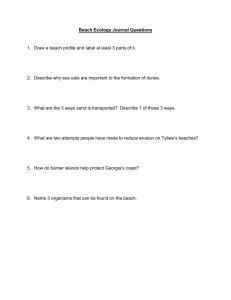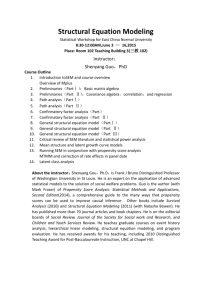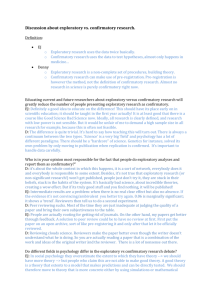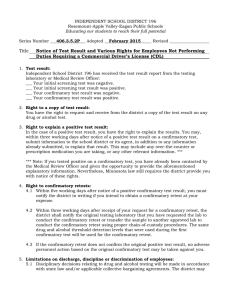Level 3 Essential Communication Skills Sample
advertisement
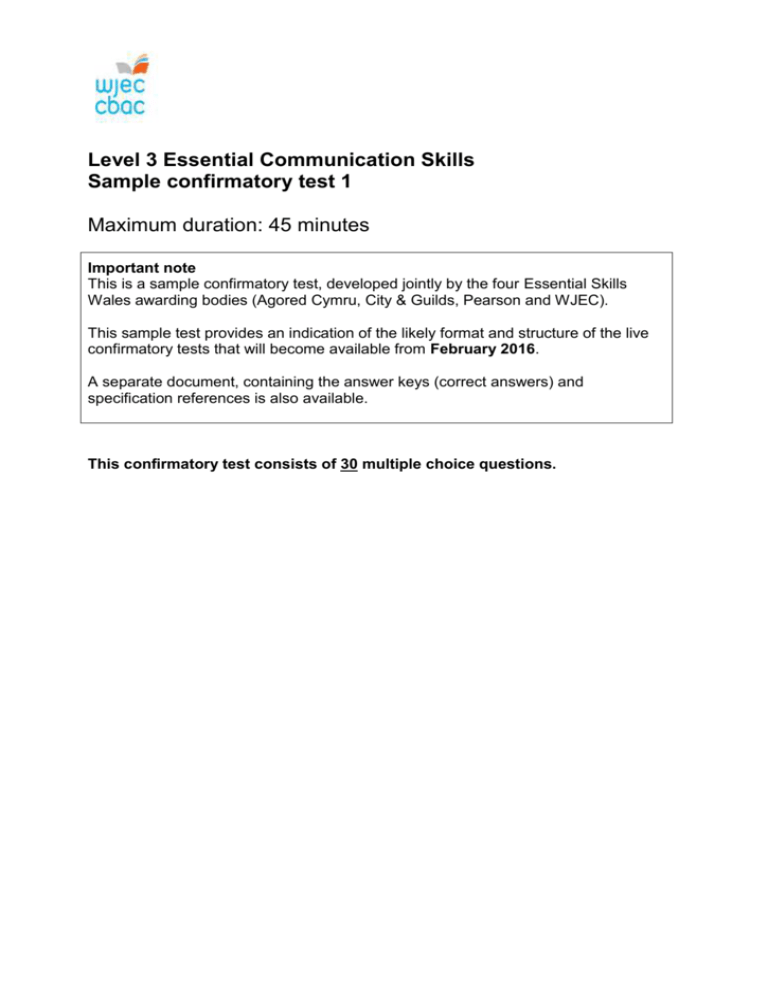
Level 3 Essential Communication Skills Sample confirmatory test 1 Maximum duration: 45 minutes Important note This is a sample confirmatory test, developed jointly by the four Essential Skills Wales awarding bodies (Agored Cymru, City & Guilds, Pearson and WJEC). This sample test provides an indication of the likely format and structure of the live confirmatory tests that will become available from February 2016. A separate document, containing the answer keys (correct answers) and specification references is also available. This confirmatory test consists of 30 multiple choice questions. Questions 1 to 11 are based on this draft document about working class daily life in London in 1913. In 1913, England was a world leader in textile production and enjoyed unprecedented wealth and trade. Workers flocked from the countryside to the cities, attracted by factory jobs. However, the common living arrangements for factory working families were rented, shared insanitary two-storey, dilapidated houses with damp basements or larger tenement buildings. Very few families could afford to buy a home. Large families by today’s standards of six to eight would usually have had only two small rooms to live in. They cooked on a single gas burner, had a fire for warmth and used a commuinal tap and toilet outside. Despite people’s best efforts to keep houses and family members clean through the hard labour of carrying buckets of water and using what little soap or soda they had, the houses were full of disease and pests such as insects and vermin. 1 2 3 4 5 6 7 8 9 Lower rooms and basements were cheaper, but dark, cold and damp, so would require more coal for heating and oil for lamps. Upper rooms were often smaller with good windows, but cost a great deal more. A standard working class income was £1 a week, which would not meet all of the needs of a family. They had to constantly and agonisingly prioritise between living conditions and food. Children in basements were more prone to illness, whilst children in the upper rooms may have had less food. 10 11 12 13 14 Alarmingly, most children never tasted milk once they stopped breast feeding. Fresh milk was far too expensive. Their daily diet consisted of bread and scrape (a thin spread of dripping or butter), tea with a drop of condensed milk. Fresh fruit was unheard of and there were hardly any vegetables apart from potatoes. 15 16 17 18 Protein was reserved for the father, to give him enough calories to enable him to carry out his gruelling daily manual labour as the main provider for the family. Working days lasted for around 13 hours. If the man were to fall ill, the entire ______ survival would be put in jeopardy. However, he would only receive a tiny piece of meat or fish, referred to as his ‘relish’ for tea. 19 20 21 22 1. The main purpose of this document is to a) b) c) d) persuade argue inform instruct 2. Which of the following words best described the writer’s view of living conditions in 1913? a) b) c) d) nostalgic impartial angry critical 3. This document could best be described as offering a) b) c) d) a balanced discussion of issues justification for one point of view about poverty advice on alleviating poverty a description of issues Level 3 Essential Communication Skills - sample confirmatory test Page 2 of 10 4. According to this document, which of the following statements is true? a) b) c) d) Men were often unemployed Most houses had problems with pests The houses were always dirty There was never any food to eat 5. What does the writer think is the most shocking fact about living conditions? a) b) c) d) Whole families lived in one or two rooms Families lived in damp basements Most days only men ate meat Children could not drink fresh milk 6. Which of the following reasons are not given for living in upper rooms?? a) b) c) d) Children are less likely to become ill More light and air Fewer insects and vermin Cheaper to heat 7. The word ‘commuinal’ on line 6 should be spelled a) b) c) d) comuinel comuinal communel communal 8. The missing word on line 21 should be written as a) b) c) d) families’ family’s familys familie’s 9. Why is there a new paragraph at line 15? a) b) c) d) change of time change of place change of topic change of character Level 3 Essential Communication Skills - sample confirmatory test Page 3 of 10 10. Why does the writer refer to ‘unprecedented wealth and trade’ in lines 1 and 2? a) b) c) d) to show that not everyone suffered to show the contrast between wealthy and poor to show that this was why England was wealthy to show that everyone worked hard 11. Why does the writer say that ‘Protein was reserved for the father’? a) b) c) d) the father needed the additional calories the father was the only worker the father would not get bread and scrape the father earnt £1 a week Level 3 Essential Communication Skills - sample confirmatory test Page 4 of 10 Questions 12 to 22 are based on this draft document about Whitehaven Beach. 1 Have you ever pictured the perfect beach? 2 3 4 5 Whitehaven Beach is a 7km stretch of pure, unspoilt, icing sugar sand paradise, surrounded by crystal clear, aqua waters. It is far from the hustle and bustle of Sydney’s busy harbour. Located on Whitsunday Island, the largest of the Whitsunday Islands in the Great Barrier Reef, off the coast of Queensland, Australia, it is only accessible by boat. 6 7 8 9 The seas can be boisterous between the islands on windy days, but as the boat that takes you there is also used by locals to commute to jobs on other islands, such as Hamilton Island you can be reassured by locals texting and sleeping amid the swell. It is undoubtedly worth the jorney, even for those without natural sea legs, like me. 10 11 12 13 Whitehaven Beach is a place of blissful tranquillity and unparalelled beauty. You can’t take a dog there, have a barbecue or leave litter there due to the understandably draconian conservation rules, but you can sit in the glorious sunshine relax and take in the sweeping majesty of the shoreline in this heaven on Earth 12. The main purpose of this document is to a) b) c) d) instruct you to visit Whitehaven Beach explain Australian conservation rules advertise boat trips in Australia describe Whitehaven Beach 13. The picture is used to a) b) c) d) show where Whitehaven Beach is show how long Whitehaven Beach is show what Whitehaven Beach looks like show how you can get to Whitehaven Beach Level 3 Essential Communication Skills - sample confirmatory test Page 5 of 10 14. The word ‘unparalelled’ on line 10 should be spelled a) b) c) d) unparralelled unparalleled unparalleled unparallelled 15. There is missing punctuation on a) b) c) d) line 1 line 3 line 10 line 12 16. The work ‘jorney’ on line 8 should be spelled a) b) c) d) jerney journey jurney juorney 17. Which of the following techniques does the writer not use? a) b) c) d) facts imagery statistics rhetorical questions 18. There is missing punctuation on line 7. Which of the following would be most appropriate? a) b) c) d) comma hyphen semi-colon colon 19. What is the writer implying about the boat journey in paragraph 2? a) b) c) d) the boat is not used in rough seas the seas are not really rough the locals are used to the rough seas the writer is used to rough seas Level 3 Essential Communication Skills - sample confirmatory test Page 6 of 10 20. Without changing the language, which would be the most appropriate medium for presenting this information?? a) b) c) d) travel blog report broadsheet article speech 21. The best of the following titles for this document would be a) b) c) d) A Holiday Haven: A Rough Trip A Holiday Haven: Journey to Australia A Holiday Haven: Heaven is a Place on Earth A Holiday Haven: No Dogs Allowed 22. What is meant by the word ‘draconian’ in the context of line 11? a) b) c) d) wrong strict excessive repressive Level 3 Essential Communication Skills - sample confirmatory test Page 7 of 10 Questions 23 to 27 are based on this document. 1 Residential Lettings 2 3 4 5 6 7 8 9 10 Property Management 1 Low Road Cardiff CZ99 9ZZ Date: 21/07/2015 Miss Jones 21 High Road Cardiff CA99 9ZZ 11 Dear Miss Jones, 12 Re: Legionella Risk Assessment of your property 13 14 15 16 17 18 19 As your property managing agent, we need to bring to your attention the following legislation that affects your property immediately. The Health and Safety at Work Act 1974 and the Control of Substances Hazardous to Health 1999 gave guidance on the control of bacteria in water heating and cooling systems. These issues were mostly relevant to industrial buildings; however, recent changes to the ‘Control of Legionella bacteria in Water Systems Approved Code of Practice (“ACOP L8”), now apply to domestic dwellings. It is therefore a legal requirement and all landlords of residential rental dwellings must have a Legionella Risk Assessment every two years by a competent professional. 20 21 22 ACOP L8 was approved by the Health and Safety Commission, and the Secretary of State. As such it has a legal status and if you are prosecuted for non-compliance a court will find you at fault. This legislation has been brought in to safeguard tenants and landlords alike and we are obligated to inform you about it. 23 24 25 26 27 28 29 30 As your property managing agent, we can reduce this burden for you, by carrying out the Legionella Risk Assessment on your behalf. We appreciate that there are many costs involved with renting your property and so we have negotiated a reduced rate of £125.00 plus VAT for this service with our approved contractor. If you would like to arrange your own Legionella Risk Assessment, please let us know before the end of July, otherwise a Risk Assessment will be arranged on your behalf and attributed costs charged to your account. Failure to respond within the given time will be treated as consent for us to act legally on your behalf. 31 Yours Sincerely, 32 D. Evans (on behalf of Residential Lettings) 23. What is the main purpose of paragraph 1? a) b) c) d) to make Miss Jones aware of the legal changes to advise about appropriate methods for the Risk Assessment to ensure that Miss Jones pays the fee of £125.00 plus VAT to comply with The Health and Safety at Work Act 1974 Level 3 Essential Communication Skills - sample confirmatory test Page 8 of 10 24. What impression does the writer give about the consequences of not having the Risk Assessment carried out?? a) b) c) d) that Residential Lettings may be prosecuted that the landlord may be prosecuted that the tenant may be safeguarded that the landlord may be safeguarded 25. There is a mistake in the sentence on line 20. Which is the following sentences is correct? a) ACOP L8 was approved, by the Health and Safety Commission and the Secretary of State. b) ACOP L8 was approved by the Health and Safety Commission; and the Secretary of State. c) ACOP L8 was approved by the Health and Safety Commission and the Secretary of State. d) ACOP L8: was approved by the Health and Safety Commission and the Secretary of State. 26. What does the extract tell us about Legionella? a) b) c) d) it only affects industrial buildings it affects water systems in buildings it now only affects domestic dwellings it only affects rented dwellings 27. What is the writer’s intention in paragraph 3?? a) b) c) d) to outline the consequences of not complying with the legislation to reduce the costs associated with renting to ensure that they comply with the legislation to explain the cost of their Risk Assessment Level 3 Essential Communication Skills - sample confirmatory test Page 9 of 10 Questions 28 to 30 are general questions. 28. Which of the following sentences is correct? a) b) c) d) The kitchen needs painting badly and I must get it done. The kitchen needs painting badly, and I must get it done. The kitchen badly needs painting, and I must get it done. The kitchen badly needs painting and I must get it done. 29. Which word would correctly complete the following sentence? The weather in Britain is so __________ that there is always something to talk about. a) b) c) d) changeible changeable changable changeble 30. Which one of the following is incorrect? a) b) c) d) Martin loves travelling, he is going to Colorado next year. Martin loves travelling. He is going to Colorado next year. Martin loves travelling; he is going to Colorado next year. Martin loves travelling so he is going to Colorado next year End of test Level 3 Essential Communication Skills - sample confirmatory test Page 10 of 10
